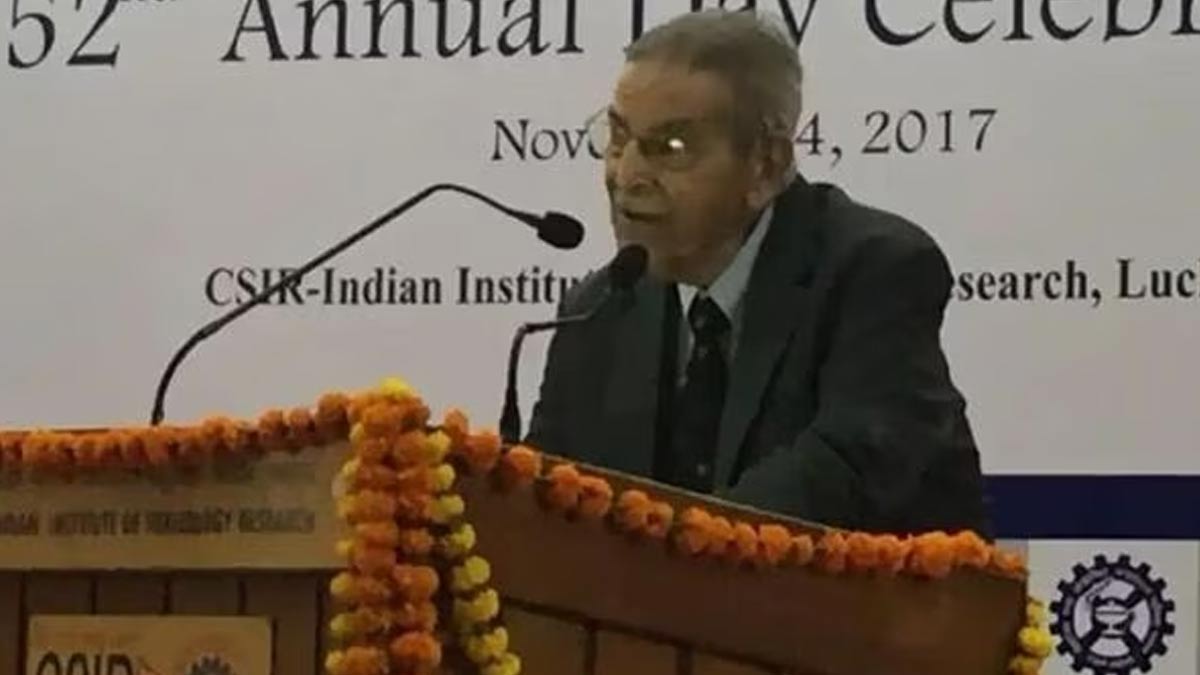
Dr Nitya Anand, known for developing India’s first oral contraceptive pill, ‘Saheli’ passed away on Saturday, at the age of 99 at Sanjay Gandhi Post Graduate Institute of Medical Sciences (SGPGIMS), Lucknow, due to prolonged illness.
Table of Content:-
He had joined Central Drug Research Institute (CDRI) in 1951 as a scientist, headed Medicinal Chemistry Division from 1963 to 1974 and became the Director of CDRI from 1974 to 1984.
The Story Of Creation Of ‘Saheli’

Dr Nitya Anand was behind the discovery of ‘Centchroman’, famously known as ‘Saheli’ India’s first oral contraceptive pill. Saheli is the first of its kind and only non-hormonal, non-steroidal and once-a-week oral contraceptive pill available worldwide till date.
The development of Saheli dates back to the sixties when the government emphasised on the need of proper family planning. According to the Council of Scientific and Industrial Research (CSIR), Dr. Nitya Anand and his team at CSIR-CDRI, Lucknow embarked on the journey to develop the non-hormonal contraceptive pills, responding to the Government of India's need for an effective family planning/birth control pill indigenously.
Centchorman (Ormeloxifene) was derived in 1971, after several years of hard work by Dr Nitya Anand and his team, CSIR stated. It was launched by the then Prime Minister Rajiv Gandhi in 1986 and was incorporated into the National Family Planning Programme of India in 2016.
Also read: Emergency Contraceptive Pill: All You Need To Know
Saheli And Other Oral Contraceptive Pills: Difference
According to a study by the National Institute of Health, US, “Oral contraceptives (birth control pills) are hormone-containing medications that are taken by mouth to prevent pregnancy. They prevent pregnancy by inhibiting ovulation and also by preventing sperm from penetrating through the cervix.” These pills are usually taken for 21 days starting from the first week of your menstrual cycle. The pills can cause hormonal imbalance giving rise to many side effects like nausea, headaches, cramps and so on.
Whereas, the pill developed by Dr Nitya Anand is a non-hormonal, non-steroidal and only once-weekly oral contraceptive which remains one of its kind until today. It is considered to be safer and does not have the above mentioned side effects.
To understand about this non-hormonal, non-steroidal oral contraceptive pill, ‘Saheli’ Only My Health team interacted with Dr Mita Verma, Gynecologist- Obstetrician, Laproscopic Surgeon, New Delhi.

Giving a very simple explanation, Dr Verma said, “Unlike other contraceptive pills, Saheli does not contain ovarian hormones oestrogen and progesterone as a result, Saheli does not have adverse hormonal effects on ovaries.”
Listing the advantages and explaining the need of Saheli’s availability in the market, CSIR-CDRI stated, “One of the main focus was to have an alternative to steroidal pills available in the market which were not free from side effects. There are several advantages of Saheli over hormonal oral contraceptives.Saheli has no side effects like vomiting, nausea, and weight gain. In addition, it can be taken by women of all ages (reproductive age) and is also considered safe for use among breastfeeding women. This makes Saheli a better choice among all oral contraceptives for family planning.”
Also read: Do Not Pop Vaginal Boils: Gynaecologist Explains Why And How To Treat Them Safely
Other Achievements Of Dr Nitya Anand
Dr Nitya Anand assisted in formulating different drug policies for the government of India for nearly four decades. He has also been an adviser and consultant to a lot of scientific bodies and institutions. Dr Nitya Anand received Padma Shri award in 2012 from the Indian government for his achievements. He has published over 400 research papers and over 130 patents.
The Padma Shri Awardee is survived by his daughter Dr Sonia Nityanand, Vice-Chancellor of King George’s Medical University (KGMU) and two sons, Neeraj Nityanand and Dr Naveen Nityanand.
Also watch this video
How we keep this article up to date:
We work with experts and keep a close eye on the latest in health and wellness. Whenever there is a new research or helpful information, we update our articles with accurate and useful advice.
Current Version